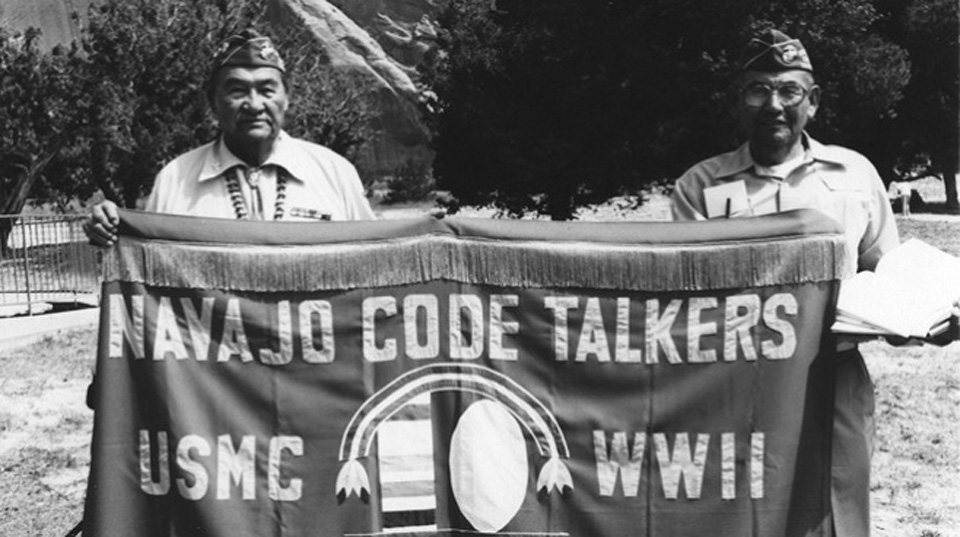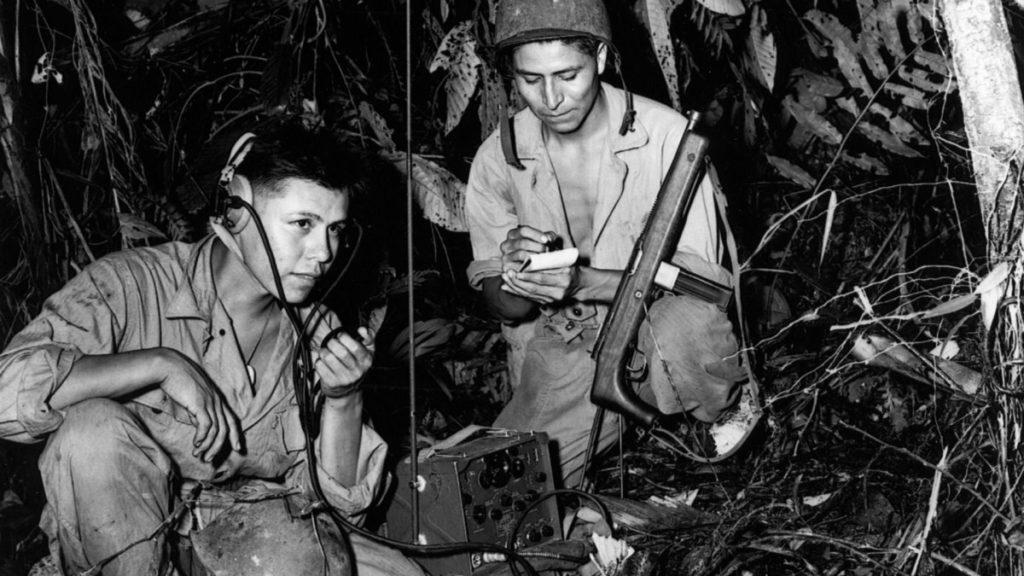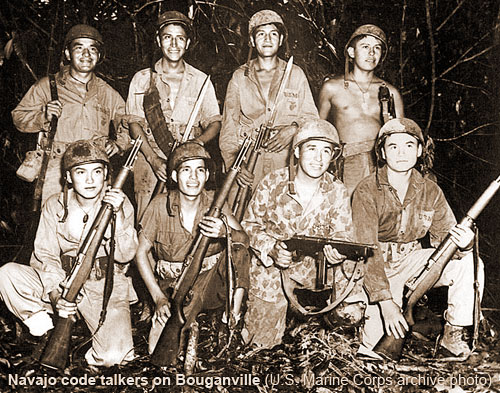
Whispers of War: The Unbreakable Code of America’s Native American Code Talkers
In the annals of military history, where tales of valor and ingenuity often emerge from the crucible of conflict, few stories are as compelling and unique as that of the Native American Code Talkers of World War II. These unsung heroes, hailing from tribes across the United States, employed their ancestral languages – complex, unwritten, and utterly foreign to America’s enemies – as an impregnable shield, creating the only unbroken codes of the war. Their service, shrouded in secrecy for decades, saved countless lives, accelerated Allied victories, and stands as a testament to the diverse and often overlooked contributions to the defense of freedom.
The desperate need for secure communication during World War II was a constant headache for Allied commanders. German and Japanese intelligence had become remarkably adept at intercepting and deciphering conventional military codes, often learning of Allied plans before they could be executed. This cryptographic vulnerability led to disastrous ambushes, lost campaigns, and a staggering toll in human lives. The quest for an unbreakable code was paramount, a strategic imperative that ultimately led to an unexpected solution rooted in the rich linguistic heritage of America’s Indigenous peoples.
The idea first gained traction with Philip Johnston, a non-Native American raised on the Navajo Reservation as the son of a missionary. Fluent in Navajo, Johnston understood the language’s incredible complexity and its rarity outside the Navajo Nation. He knew it was unwritten, had no alphabet, and possessed a grammar and syntax so intricate that even highly trained linguists would struggle to comprehend it without years of immersion. In early 1942, Johnston approached the U.S. Marine Corps with a radical proposal: use Navajo speakers to transmit tactical messages. His demonstration to skeptical officers proved the language’s effectiveness almost immediately; a message that took a code machine operator 30 minutes to encrypt and transmit, and another 30 to decrypt, was relayed by two Navajos in just 20 seconds. The solution was elegant in its simplicity and profound in its implications.
The Marine Corps swiftly moved forward, recruiting 29 young Navajo men in May 1942, who would form the core of the first Navajo Code Talkers. These initial recruits were tasked not just with speaking their language, but with developing a specialized military code within it. They created a dictionary of Navajo words that could stand in for military terms for which there were no direct equivalents. For instance, "Besh-na-dle-heh" (iron fish) became the code word for submarine, "Cha" (beaver) for tank, "Gah" (rabbit) for plane, and "Lo-tso" (whale) for battleship. Crucially, they also developed a phonetic alphabet, assigning Navajo words to individual English letters (e.g., "Wol-la-chee" for "A" meaning ant, "Shush" for "B" meaning bear), allowing them to spell out names and less common terms. This dual-layered system made the code virtually impenetrable.
The impact of the Navajo Code Talkers in the Pacific Theater was nothing short of revolutionary. Deployed primarily with Marine units, they became the vital communication link in some of the war’s most brutal and pivotal campaigns, from Guadalcanal and Tarawa to Saipan and Iwo Jima. Their ability to transmit sensitive information rapidly and accurately under intense fire gave American forces an unprecedented tactical advantage. Messages that would have taken hours to encrypt, transmit, and decrypt using conventional methods were sent and received in minutes, often seconds, by the Code Talkers. This speed was critical in rapidly evolving battles, enabling commanders to coordinate movements, call for fire support, and relay intelligence with unmatched efficiency.

Perhaps the most famous testament to their invaluable service came during the Battle of Iwo Jima in February-March 1945. For 36 grueling days, six Navajo Code Talkers worked around the clock, sending and receiving over 800 messages without a single error. Major Howard Connor, a Signal Officer of the 5th Marine Division, famously declared, "Were it not for the Navajos, the Marines would never have taken Iwo Jima." This sentiment echoed across the Pacific, where their linguistic prowess became synonymous with operational success and casualty reduction. By the end of the war, approximately 400 Navajo men had served as Code Talkers, their contribution indelible.
While the Navajo Code Talkers are the most widely recognized, they were not alone in their unique service. Other Native American tribes also contributed their languages to the war effort, often in different theaters. In the European Theater, Comanche Code Talkers played a crucial role, particularly during the D-Day landings and the subsequent push through France. Like the Navajos, they developed a specialized vocabulary, using words like "posah-tai-vo" (crazy white man) for Hitler and "tapi-co" (mole) for tank. Their transmissions provided secure communication for the 4th Infantry Division, helping to coordinate movements and prevent German intercepts.
Similarly, tribes such as the Choctaw, Cherokee, Lakota, Meskwaki, Hopi, Creek, and Seminole contributed their own Code Talkers. The Choctaw, in fact, hold the distinction of being the first to employ their language for military communication during World War I, proving the concept decades earlier. In WWII, these diverse groups served in various branches and theaters, from North Africa to the Philippines, each group using their distinct linguistic heritage as a shield against enemy intelligence. Their stories, though often less publicized than the Navajos’, are equally vital to the complete narrative of the Code Talkers.
The service of these Native American soldiers was made even more remarkable by the profound paradox of their circumstances. They fought for a nation that had, for generations, systematically sought to suppress their languages and cultures, often through forced assimilation policies in boarding schools. Many Code Talkers had been punished for speaking their native tongues as children, only to find those very languages become their most potent weapons for the United States. Furthermore, despite their invaluable contributions, they often faced the same racial discrimination as other minority soldiers, both within the military and upon returning home.
The extreme secrecy surrounding their mission also cast a long shadow. The Code Talkers were ordered not to reveal their work, not even to their families, for fear that the code might be needed again in a future conflict. This oath of silence, maintained for decades, meant that many of these heroes returned to their communities without the recognition they deserved, their vital contributions remaining unacknowledged by the public and even their loved ones. The psychological burden of carrying such a significant secret, while simultaneously enduring the anonymity of their heroism, was immense.
It wasn’t until 1968 that the Navajo code was finally declassified, and the stories of these extraordinary men began to emerge from the shadows. Initial recognition was slow, but public awareness grew over time. In 1982, President Ronald Reagan declared August 14th "National Navajo Code Talkers Day," bringing long-overdue honor to their service. The highest recognition came in 2000, when President Bill Clinton awarded the Congressional Gold Medal to the original 29 Navajo Code Talkers, and Silver Medals to the hundreds who followed. In 2007, similar honors were bestowed upon Code Talkers from other tribes, finally acknowledging the collective ingenuity and sacrifice of all Native American Code Talkers.
Today, the legacy of the Native American Code Talkers is celebrated as a powerful symbol of resilience, patriotism, and the strength found in cultural diversity. Their story is taught in schools, featured in museums, and honored in monuments, ensuring that future generations understand the profound impact of their contributions. These men, who once whispered secrets in their ancestral tongues across the battlefields of a world at war, transformed their unique cultural heritage into an unbreakable weapon. They stand as enduring heroes, their voices having secured not just military victories, but also a vital place in the collective memory of a grateful nation. Their whispers, once a shield against tyranny, now echo as a resounding testament to courage, ingenuity, and unwavering loyalty.



